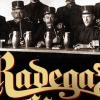18 July 2025
To Vincenzo Scerbo, Sales and Marketing, Salvi Harps
Dear Vincenzo
We have known each other for many years, which is why I am writing this letter to you personally. You have looked after me as an artist, for my many performances for Salvi Harps over the years and we have shared pizza and wine, as friends, after concerts. We both know how dedicated we each are to our respective jobs, to raising our children well and to our international friends and connections. We initially met because I won a competition sponsored by Salvi Harps and I am indebted to the company for its part in helping me to establish myself on an international stage. I would like to offer some background to my interest and involvement with Israeli and Palestinian music and I shall punctuate my thoughts and findings with informed and insightful quotes from the great musician, Daniel Barenboim. This is because Barenboim represents the western classical music training and global music-making that I am a product of, whilst also being the advocate for different cultures that I aspire to be.
“Music should be seen as a metaphor for life, capable of demonstrating
the great qualities of leadership” Daniel Barenboim
My first teacher, the late Daphne Boden, was an ardent supporter of the Israel Harp Contest and of Israeli composers, most of whom hailed from Eastern Europe, Germany and Argentina. I learned the music of Sergiu Natra, Ami Maayani and Paul Ben-Haim, all richly influenced by Arabic makams (tonality) and rhythmic patterns. This sparked my interest in more contemporary Israeli composers such as Yinam Leef, whose work features on my Crown of Ariadne album. As a lover of poetry, I read Rivka Miriam and she became my favourite of the ‘Holocaust poets’, with me quoting her words in my compositions. I also read the Palestinian poet Mahmoud Darwish; his 2007 collection ‘The Butterfly’s Burden’ kept me company as I was scoring a Ballet Wales production. Around the same time, I also discovered Daniel Barenboim’s Reith Lectures for the BBC, which bring musical context to the discord between the Israeli occupation and the Palestinians’ right to their land and culture. I highly recommend listening to these via BBC Sounds or reading the transcripts which are available online.
Barenboim, an Argentinian musician who was brought up in Israel and also has Spanish and Palestinian citizenship, collaborated with Palestinian intellectual Edward Said to found the West-Eastern Divan Orchestra, actively using music to bridge the socio-political divide. He donated his entire prize money from a Jewish institute in Germany for the studying and research of Classical Arab music, in order to combat the problems of Israeli musicians acting as if there was a cultural void in the area before the State of Israel was created. In 2007, Barenboim and 20 musicians from Britain, USA, France, Germany and one from Palestine, were scheduled to play a Baroque music concert in Gaza. Despite obtaining prior clearance from Israeli authorities, the Palestinian in the ensemble was stopped at the Israel-Gaza border, and told that he needed individual permission to enter. The group waited seven hours at the border and ultimately chose to cancel the concert, in solidarity.
“Nothing in music is independent. It requires the perfect balance between head, heart and stomach. When emotion and intellect are in tune, it is easier also for human beings, and for nations, to look outward as well as inward. And therefore through music, we can see an alternative social model, a kind of practical utopia, through which we might learn about expressing ourselves freely, and hearing one another.” Daniel Barenboim
I wrote to you earlier this year (by email, March 5th), asking if Salvi Harps would reconsider their sponsorship of the Israel International Harp Contest: an event synonymous with the name of Salvi Harps and the late Victor Salvi, since its inaugaural contest in 1959. I withdrew from my participation in an event hosted by Salvi this year, as I was utterly appalled that the Israel Harp Contest 2025 was (and is) still going ahead, despite Israel committing a genocide and multitudinous war crimes against Gaza and the West Bank. As cited last month at the United Nations Human Rights Council in Geneva, “The goal of the Israeli government is abundantly clear; the destruction of life in Gaza.” In your email reply to me, you said that “the International Harp Contest in Israel aims to serve a global community of harpists, beyond any political or economic implications.” I would like to take issue with that statement and ask you once again to reconsider Salvi Harps’ connection with the contest this year. When I wrote to the Israel Harp Contest organisers (twice, by email, 10th June being my latest communication to them [see attached email transcript]), they did not respond to me, or to my important question. “I would like to ask you if you would be able to make a public statement about why you feel it is appropriate and encouraging to the world's harpists to host the competition at this time, in Jerusalem, and if, and how, you feel it will positively impact the careers of the jury members, competitors and ultimately the winner of the 2025 competition.”
Contest – from the Latin ‘contestare’ = ‘con + testare’ = bear witness or call a witness
Taken from the book of the history of the Israel Harp Contest,
‘The Sound of the Harp in the Holy Land’ by William Y Elias
Why are there no harps and no harpists in Palestine? It is not that our instrument is prohibited by Judaism, Christianity or Islam, so there simply must be “political and economic implications”. I learned from a November 2009 article that Deputy Defense Minister Matan Vilnai responded to a query submitted by MK Dov Khenin in July 2009 regarding the ban on importing musical instruments into Gaza. Vilnai claimed that: “According to the information available, no applications to bring musical instruments into the Gaza Strip have been received for the past two years.” In reality, between 2007 and 2009, every request to bring musical instruments into Gaza, made by many international aid organisations and private individuals, was denied.
Deputy Minister Vilnai added that “there are a number of materials and types of goods that are banned from import into the Strip due to the possibility that they will aid terrorist activity or because their import deviates from the policy, which is “a broad-ranging civil-humanitarian policy.” The first category of prohibited materials – which have a civilian use but could also be used as weapons – are publicly listed. But the second category of banned goods – items such as musical instruments, sesame seeds and toys, which do not fall within the criteria for import included in “civil-humanitarian policies” – are not listed anywhere. This is because the State of Israel refuses to publish a list of permissible items for import and refuses to publish a list of items prohibited because they are not deemed sufficiently necessary for humanitarian needs. We can only assume that full-size concert harps must fall outside the remit of what is deemed necessary for humanitarian needs by the occupying Israeli forces prohibiting the import of instruments and toys into the Gaza Strip.
You may ask, what can possibly be done to cultivate music education in Gaza and the West Bank anyway? It is universally recognised that music education plays a crucial role in cognitive development, creativity and social skills, making it an essential aspect of childhood development. Even during this horrific genocide in which over 55,000 innocent Palestinian civilians have been murdered, educators and musicians lead with love, continue to build community and continue to practice the most powerful form of resistance - music. One of my Gazan friends, Ahmed Abu Amsha, is a musician, educator and director of ‘Gaza Birds Singing’, a musical group made up of displaced children and talented music teachers from Gaza. With the help of friends around the world, Ahmed has released six tracks via Bandcamp, original music mingled with the ever-present sound of Israeli drones, to raise money to keep his community alive. Speaking of staying alive in Gaza, allow me to reflect on the current prices of the scarcely available food basics.
One bag of flour, as of 16th July 2025, costs $1450. Its market price is $1000 but to get $1000 cash out in Gaza, he has to go through an agent on the black market who takes 45%. Therefore Ahmed, a musician like myself, with five children and a wife, is barely able to access the donations that the global music-loving community make to his charity, as they are “locked behind a wall of impossible exchange rates”. Despite this, Ahmed is an exemplar of what community looks and sounds like; he continues to make music with the children, using broken guitars, ouds and any instruments that prevail despite constant bombing and the afore mentioned efforts of the Israeli government to erase all culture from Gazan citizens, as well as their lives.
"In a piece of music, harmony can be achieved.
Even if it is made up of conflicting elements, albeit of the strongest and most radical nature,
as long as each element can develop itself to its fullest." Daniel Barenboim
This letter is signed by those who believe that music is a fundamental aspect of human flourishing and should be accessible to all. Whilst music can transcend cultural boundaries and is widely acknowledged to be a universal language, this letter aims to show that the Israeli government prohibits the harp even from entering Gaza. It is abominable to us that the Israeli government that hosts and revels in three major international music events in Israel - namely the Israel Harp Contest (1959 onwards), the Israel Festival (1961 onwards) and the Zimraya World Choir Festival (1952 onwards) – is also responsible for the fact there are no Palestinian harpists. Yes, it is true that a former member of the militant Zionist youth party, Aharon Zvi Propes, founded each one of these events, but sixty-five years on from this (and the founding of the American Harp Society that happened during that very first contest) it is time to revisit the motivation for bringing the world’s harpists into Israel and to examine, in full moral conscience, what they are being called to bear witness to.
It is clear to me that the same government that disallows musical instruments to enter Palestine also benefits hugely from international cultural events that bring glory to the State of Israel. At this time, I believe that Salvi Harps should stand with me, a representative of the true global community of harpists, to say a resounding “No” to the 2025 Israel International Harp Contest and to confidently say that it would damage the reputation of our instrument and its players to host the contest in Israel this year.
Yours sincerely,
Eleanor Turner
Appendix:
Below is my email of 10th June 2025, sent to the organisers of the Israel International Harp Contest at the published email address [email protected]
This was the second time of emailing the organisers to ask for an official statement and I did not receive a reply to either email.
Dear Sir/Madam
I write again. Perhaps my original email from last Wednesday got stuck. Harpists around the world are waiting for this important information, especially in the light of the blockage of Freedom Flotilla MADLEEN blocking aid to Gaza and imprisoning the 12 crew members. This is not a safe environment to bring international musicians to and with Gaza being only 62 miles from Jerusalem, we would like to hear how you plan to justify this important harp event occurring at this time and in this place.
I am calling for my harp company, Salvi Harps, to withdraw their sponsorship of the competition because I believe it it immoral to host an international competition whilst a genocide is being enacted against the Palestinian people. I also believe that it is exploitative of the young artists involved to get them to compete at this time, when they may be unaware of the humanitarian crisis ongoing and the war crimes that IDF is perpetrating against the people of Gaza and the West Bank. After all, having competed and been placed in, or won, five international competitions myself, I know how completely single minded one is when preparing at this level.
I have been only communicating with Salvi Harps due to my personal connection with Salvi, not some kind of desire to see them suffer. On the contrary, I play Salvi Harps and have done since I was 5 years old, so it pains me to see them turning a blind eye to this. I feel compelled to drawing on our long standing association when asking them repeatedly to withdraw their funding and support of the Israel International Harp Contest.
I would like to ask you if you would be able to make a public statement about why you feel it is appropriate and encouraging to the world's harpists to host the competition at this time, in Jerusalem, and if, and how, you feel it will positively impact the careers of the jury members, competitors and ultimately the winner of the 2025 competition.
Many thanks
Yours sincerely
Ms Eleanor Turner















